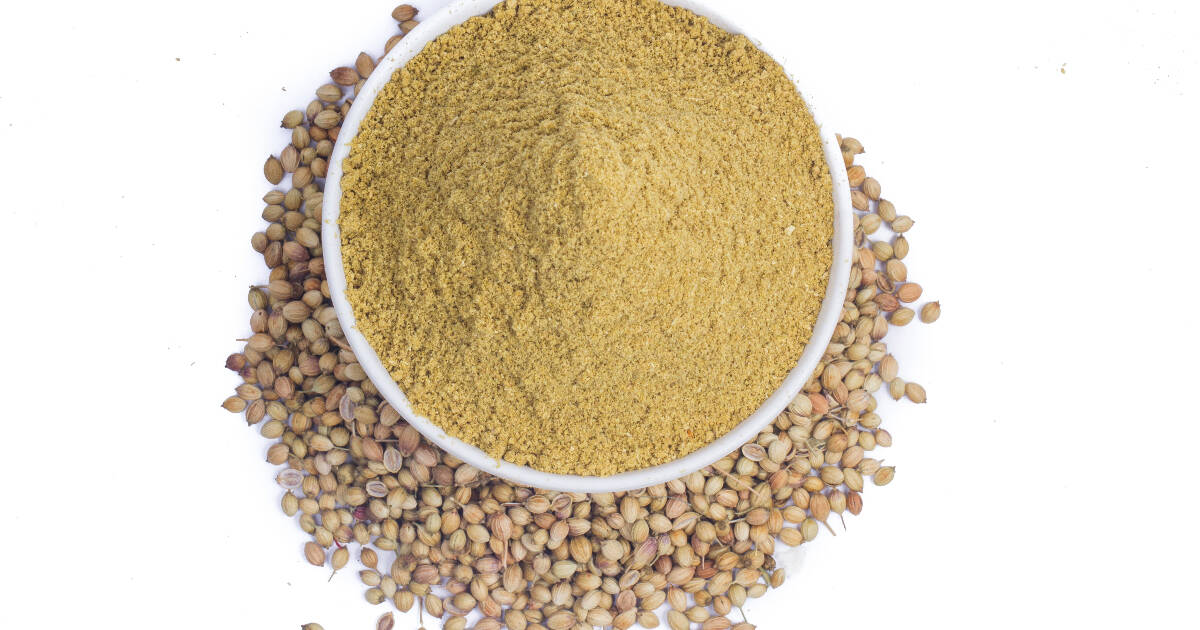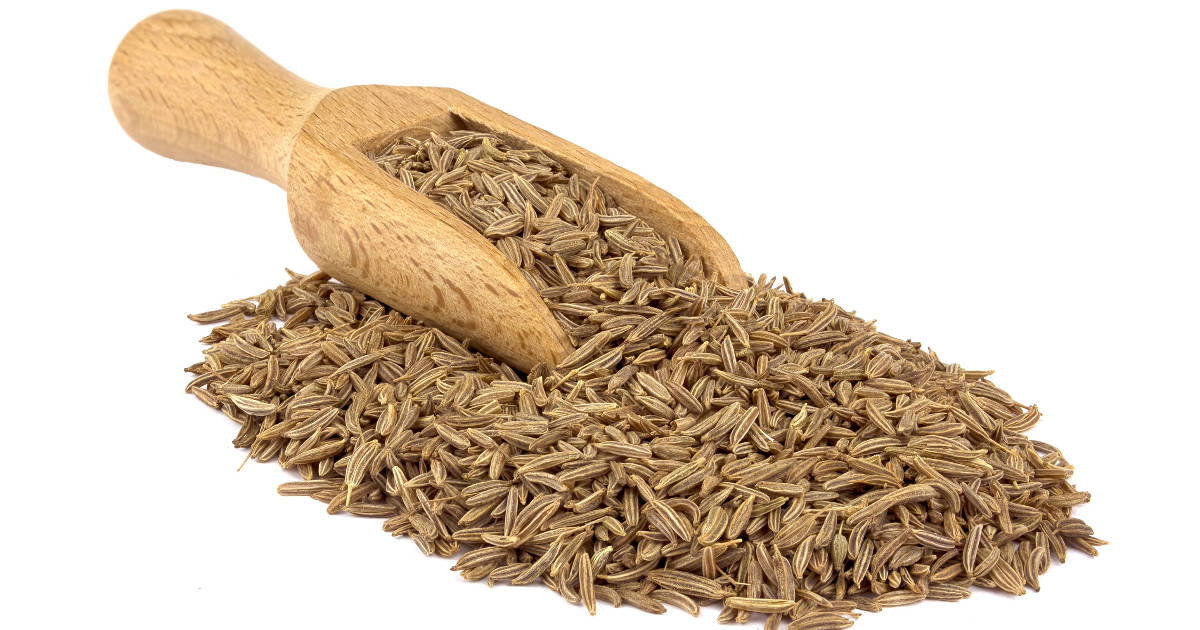Cumin and coriander are two of the most popular spices used around the world. However, many people find it difficult to distinguish between them as they share some similarities.

Learn about the key differences between coriander powder and cumin so you can use them properly in recipes.
Coriander and Cumin

Coriander and cumin both originate from plant seeds and are common ingredients in dishes from around the world. They have some similarities but very distinct flavors and uses.
Coriander comes from the round, brown seeds of the coriander plant. The leaves of the same plant are known as cilantro. Coriander powder has a sweet, slightly peppery citrus flavor. It is versatile and used in both savory dishes and desserts.
Cumin originates from the long, thin, brown seeds of the cumin plant. Cumin powder has an earthy, nutty, spicy flavor with a hint of bitterness. It is a warming spice heavily used in chili, curry, barbecue, and taco seasonings.
Key Takeaway: Coriander and cumin both come from plant seeds but have very different flavor profiles, with coriander being citrusy and sweet and cumin being earthy and spicy.
Taste and Aroma
The most noticeable difference between coriander powder and cumin is their distinct taste and aroma.
Coriander powder has a sweet, citrusy flavor with hints of pepper and lemon. It provides a subtle sweetness that works well in both savory dishes and baked goods. Coriander is described as having a bright, summery aroma.
In contrast, cumin has an earthy, nutty, and spicy flavor profile. It has a warming effect and slight bitterness. Cumin smells nutty and smokey. It is associated with rich savory dishes from around the world.
So while coriander smells fresh and lemony, cumin has a deeper musky aroma. When tasting the two side-by-side, the citrusy sweetness of coriander compared to cumin's spice and bitterness is very apparent.
Key Takeaway: Coriander tastes lemony, sweet and peppery while cumin has an earthy, nutty, spicy and slightly bitter flavor.
Cooking Uses
Due to their distinct flavors, coriander and cumin powders are used differently in recipes.
Coriander works well when added to meat marinades, particularly for lamb, chicken, and fish. It infuses a subtle sweetness and citrus flavor. Coriander combines well with cumin in spice rubs for these meats.
In curries, stews, and soups, coriander adds brightness. It is traditionally used in dishes like dal, rasam and sambar. Coriander also tastes great in veggies like potatoes, beets, and carrots.
In desserts, coriander complements fruits like apples, pears, plums and apricots. It is fantastic in cookies, cakes, and pastries, where it provides a unique citrus flavor. Coriander pairs well with lemon, ginger, and nutmeg.
Cumin shines in savory dishes where its earthy, warming flavor is desirable. As a base for chili, taco seasonings, and curry powders, it provides a signature smokiness.
Cumin complements meats like lamb, beef, and chicken. It is used around the world in staple dishes like tacos, curries, soups, and stews. Cumin also tastes great when combined with chickpeas, lentils, and beans.
Unlike coriander, cumin does not work as well in sweet dishes. Its spiciness overpowers more delicate flavors. So cumin is best reserved for hearty savory meals.
Key Takeaway: Coriander's sweet citrus taste works in both savory dishes and desserts while cumin's earthy spiciness suits savory meat and veggie dishes.
Nutrition Content
Though they are both spices, coriander, and cumin offer some key nutritional differences.
Coriander is high in vitamins C, K, and A. It also contains significant amounts of minerals like potassium, calcium, magnesium, iron, and manganese. Coriander delivers strong antioxidant benefits.
Some studies show coriander can help lower blood sugar levels, improve cholesterol profiles, and promote gut health. Its antibacterial properties support immune function. The antioxidants in coriander may also protect brain health and reduce anxiety.
Cumin is high in iron, a mineral many people are deficient in. It contains antioxidants like phenols and flavonoids that reduce oxidative stress in the body.
Cumin may boost metabolism, immunity, and digestion. It has exhibited antimicrobial properties in research and may protect against foodborne illnesses. The iron, magnesium, and calcium in cumin promote energy levels, bone health, and concentration.
So while both spices deliver key nutrients, vitamins, minerals, and antioxidants, they each offer some unique health advantages.
Key Takeaway: Coriander is high in immunity-boosting vitamin C while cumin delivers iron essential for energy and focus. Both provide antioxidants.
Can They Be Substituted for Each Other?
Since coriander and cumin have such different flavor profiles, they are not directly interchangeable in recipes.
However, in some dishes, they can work as substitutes when used carefully. In general, coriander can better stand-in for cumin, as its flavor is more subtle.
In recipes where cumin is not the star flavor, and provides a background warmth, coriander may work as a substitute. The dish will turn out sweeter and brighter rather than earthy.
Cumin could be used sparingly in place of coriander in dishes where a warming spice flavor is desired. But the bitterness of cumin can easily become overpowering.
Ideally, each spice should be used where its unique flavor profile best complements the recipe. But in a pinch, coriander and cumin can swap places while still producing a tasty dish.
Key Takeaway: In small amounts, coriander can substitute for cumin better than the reverse due to its more subtle, sweet flavor.
How to Buy and Store Coriander and Cumin
To get the best quality and flavor from your spices, it helps to buy and store them correctly.
Coriander powder is readily available pre-ground since it loses flavor quickly once ground. Look for powder that is light brown in color. Avoid coriander powder with any gray, yellow, or greenish tinges.
Store coriander powder in an airtight container away from light and heat, as exposure will cause it to stale faster. Kept dry and cool, it will maintain optimum flavor for up to 3 months.
Cumin seeds maintain their flavor better when freshly ground before use. Try to find uniform, unbroken cumin seeds that are not powdery. They should have a strong, spicy cumin aroma.
Whole cumin seeds stored in an airtight container can keep for up to a year. You can grind them as needed with a mortar and pestle or dedicated spice grinder. This will provide the freshest, richest cumin flavor.
Key Takeaway: Buy pre-ground coriander powder but whole cumin seeds to grind fresh. Always store spices in a cool, dark place in airtight containers.
Comparison Table
Comparing key differences between coriander powder and cumin:
| Coriander Powder | Cumin | |
|---|---|---|
| Flavor | Sweet, citrusy, subtly spicy | Earthy, nutty, spicy, slightly bitter |
| Aroma | Bright, lemony | Musky, smokey |
| Culinary Uses | Savory dishes, marinades, desserts | Savory dishes, chili, curry, tacos |
| Nutrition Highlights | Vitamin C, vitamin K | Iron, antioxidants |
| Substitution | Can substitute for cumin in small amounts | Not recommended as substitute for coriander |
| How to Buy | Pre-ground powder | Whole seeds to grind fresh |
FAQs
What is the flavor difference between coriander and cumin?
Coriander has a sweet, citrusy flavor while cumin has an earthy, warm, nutty taste and slight bitterness.
Can you use cumin instead of coriander?
In small amounts, cumin can substitute for coriander but the dish will end up spicier and more bitter. Coriander is a better substitute for cumin.
Is coriander the same as cilantro?
No, coriander comes from the seeds of the coriander plant while cilantro refers to its fresh leaves. But they share a similar lemony flavor.
What recipes use coriander powder versus cumin?
Coriander works well in savory marinades and desserts while cumin suits hearty savory dishes like chili, tacos, and curries.
What is the best way to store coriander and cumin powder?
Both ground coriander and whole cumin seeds are best in airtight containers away from light, heat, and moisture. Refrigeration can extend their shelf life.
Conclusion
Although coriander and cumin are frequently confused, they are quite different spices. Coriander offers a bright, citrusy sweetness while cumin has an earthy spiciness and warmth.
Due to their distinct flavors, coriander and cumin are not directly interchangeable in recipes. But in small amounts, coriander can substitute for cumin better than the reverse. Each spice pairs best with foods that complement its unique profile.
To get the most flavor and shelf life, buy pre-ground coriander powder but whole cumin seeds to freshly grind. Always store both spices properly in an airtight container in a cool, dry place away from light.

